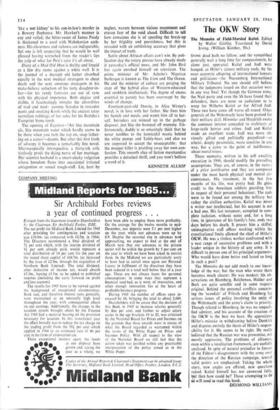Cockroaches and Kools
Equinox. By Eva Figes. (Seeker and Warburg, 21s.)
IRON HANS, in the German fairy-tale, tells his frivolous servant : 'Now you must go forth into the world and learn the meaning of poverty.' An American critic recently exhorted contem- porary novelists to explore their environment more seriously, beyond the colourful borderland of junkies and Black Moslems and interstate Rover Boy poets. For, he said, 'despite a show of naturalism, their attitude toward the poor remains quasi-romantic and sentimental.' Now along comes Hubert Selby Jr., with redress, to teach the meaning of the emotional depletion indivisible from the economic.
Last Exit to Brooklyn is the end of the pit- shaft. There is no lower level to be probed, and never before can this bedrock of violence and desperation have been bared under such a hot bitter light. Where Manhattan's rainbow ends, here are the slums and their cockroach-life of humans, which make West Side Story seem like Les Sylphides. The real-life Maria is a soddened sociopath whore who stomps stiletto heels into the eyes of the GI her Jet crowd has beaten up. No dream-sequence escape to 'Somewhere' for these nightmare hoodlums, transvestites and out- casts.
Normally I flinch from unpunctuated, un- apostrophed, uncapitalised text, yet Mr. Selby's stream of reality, an urgent ticker-tape from hell, works stunningly. I suppose there must be here the heaviest pelting of four-letter words ever • disgorged in public print, but they function properly : to grind in the face the stunted ugli- ness of these city Neanderthals. It isn't easy to prove the difference between the sensational dirty book and one using the same language and material with moral integrity. 'The nobler thing tastes better, and that is all that we can say,' decided Henry James. The taste of this stew of callousness, savagery and hatred, and the pitiful, blind gropings toward substitute tender- ness, is one of compassion for the subterraneans and rage at the averted eye.
Across from high realism to the high baroque of Second Skin. It arrives aerosprayed with star- dust, the ecstatic dust-jacket exclamations of Bernard Malamud, Saul Bellow, Susan Sontag, etc., and almost demolishes the resistance aroused by The endorsements—almost. Contentedly decay- ing in a tropical hovel, 'Skipper;' the Oliver Hardy non-hero, chronicles his picaresque shamblings, flitting about from a war-time mutiny to the suicide of his waxen-faced daughter, from his Polynesian mistress with flesh
'like a wet kidney' to his son-in-law's murder in a Bowery flophouse. Mr. Hawkes's manner is coy and veiled; the bitter-sweet of James Purdy is thickened to a curd with Nabokovian arch- ness. His cleverness and richness are indisputable, but one is left suspecting that he would be well pleased having wrenched from the reader's lips the yelp of what for Pete's sake it's all about.
Diary of a Mad Old Man is thrifty and limpid as a few dry stems against a white wall. It is the journal of a decrepit old lecher absorbed equally in the next medical stratagem to cheat death and the next amorous stratagem in his make-believe seduction of his tarty daughter-in- law—for his randy fantasies are out of sync with his physical impotence. Both elegiac and risible, it fascinatingly mingles the absurdities of trad and mod : yummy Satsuko in toreador pants and smoking Kools while the ancient takes vermilion rubbings of her soles for his Buddha's Footprint Stone tomb.
The opening of Equinox—`Air like mountain air, like mountain water which hardly seems to be there when you turn the tap on, soap lather- ing on a caress'—daunts. But after this first froth of ad-copy it becomes a remarkably fine novel. Microscopically introspective, a thirty-ish wife tirelessly prods the dying nerve of her marriage. Her scientist husband is a smart-alecky vulgarian whose boredom flares into occasional irritated antagonism or sexual rough-stuff. Liz, hurt by
neglect, wavers between vicious resentment and craven fear of the void ahead. Difficult to tell how conscious she is of speeding the break-up by her frigidity and peevishness, but this is revealed with an unblinking accuracy that gives the impact of truth.
Satire about African affairs can't win. By pub- lication day the rotary presses have already made it yesterday's official news, and Mr. John Bird has again enrobed himself on television. The prime minister of Mr. Achebe's Nigerian burlesque is known as The Lion and The Ocean. He and the minister of culture are purging the state of 'the hybrid class of Western-educated and snobbish intellectuals. The degree of excess essential to parody has been overswept by the winds of change.
Fourteen-year-old Dorrie, in Alice Winter's novel, is in love with her father. She fixes him his Scotch and meals, and wants him all to her- self. Intruders are minced up in the garbage disposer, just like she bumped off mummy. Un- fortunately, daddy is so amazingly thick that he never tumbles to the homicidal mania behind the white pumps and Teddy-bear, and also we are supposed to accept the unacceptable: that the moppet killer is prattling away her own con- fession. This smooth slice of fiction merchandise provides a detached thrill, and you won't believe a word of it.
KENNETH ALLSOP



































 Previous page
Previous page